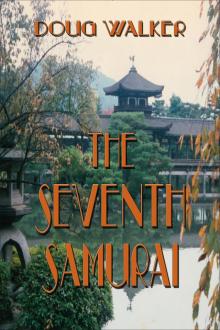- Home
- Doug Walker
The Good Deed
The Good Deed Read online
THE GOOD DEED
Copyright 2012 Doug Walker
Cover Image: "The Wanderer's Eye" via photopin cc
CHAPTER ONE
After retiring from my job, for several years I had taken group tours to various parts of the world. During my working years I had enjoyed vacations in the U.S., hiking, camping, exploring, general sight seeing. That all ended with the death of my wife a few years back. Natural causes, I assure you.
Group tours are OK. The guides know what they’re doing. You see what you’re supposed to see in an economy of time. The food is decent, baggage and flights are taken care of, and you’re herded around like sheep, or cattle, choose one. But now and then there is an urge to go off by oneself, scratch the surface of the globe in an individual style, find a spot and sit for half a dozen days if the spirit suggests.
In my case, money is an object. I have enough to get by, but lack a dash of style. I fly coach, check out cheap hotels, sometimes splurge at McDonalds, and enjoy Wendy’s chili.
Thus stated, I found myself in Dakar, the capital city of Senegal, West Africa at its best. Thrashing around for a new spot to visit, the name Timbuktu had stuck in my brain and played round and round. As a child, Timbuktu was viewed as possibly the most remote spot a person might mention. Easy to pronounce, it tripped lightly off the tongue. Timbuktu: mystery, high adventure, remoteness, culture shock. These days there are guided tours to Timbuktu, through the burning sands and wildness of Mali, Africa’s seventh largest country.
But how about an unguided tour? Hop a jet to Senegal, check into a cheap hotel accompanied by a six-pack of local beer, and check out the transportation. A tourist could do very well in that line of enterprise simply by remaining in the Dakar area and eyeballing present-day life from a perspective of its history.
Consider this: Senegal’s recorded history dates to the eighth century when it was part of the Ghana empire. But the Cap Vert Peninsula, jutting into the Atlantic as Africa’s westernmost part, was settled no later than the 15th Century. The offshore island of Goree, was first settled by the Portuguese about 1444 and shortly thereafter used as a base for exporting slaves. The Dutch and English also held sway from time to time.
But by the end of the 19th Century, France controlled all of Senegal, and Dakar on the tip of the peninsula flourished as its administrative center – now, a West African hub with a metro population of well over two million.
CHAPTER TWO
So there I was, in a cheap hotel, drinking local Flag beer for less than a buck a throw, looking out my window over what appeared to be a Dakar slum. Fortunately, I had brought along a couple of paperback books and decided to settle in for the day. Had I mentioned that my plane arrived at 2 am? Par for the course in Dakar. Toward evening, I slipped out of the hotel and went to a nearby hash house where I had a typical Sengalese meal, a large bowl of rice topped with various items stewed together, quite tasty and rather spicy.
Following that episode, I retreated to an African version of a 7-Eleven, spent a pittance in local currency, the CFA franc, which was about 544 to the U.S. dollar, for more Flag beer and retired to my room for the night. There was a feeling of being well situated and poised to begin the tourist bit any day now.
The next couple of days were spent in idle wandering and sampling local fare. A popular dish, enjoyed by all, myself included, is thieboudienne, which is rice cooked in tomato sauce with chunks of fish, vegetables and garlic tossed in. A simple dish of rice and peanut sauce proved delicious and inexpensive. Then there was chicken with onion and lemon sauce, called yassa poulet, and with fish is called yassa poisson. You linguists may have guessed by now there is a heavy French influence in Dakar.
There are French restaurants, holdovers from the colonial past, and there are also Thai, Vietnamese and Mexican. Myself, I favored the holes in the wall that featured the yassa dishes and cold Flag beer. The highest end, so I was told, was the fancy Ozio restaurant on Rue Victor Hugo – that’s where the elite meet to be elite with other elite and eye one another.
Dakar isn’t just another dusty African town complete with spear carriers, jungle drums , wild dogs and pickpockets. But there are pickpockets and scam artists with an eye out for the awe-struck tourist.
Then one day I wandered into a large restaurant that advertised moderate prices on its curbside menu, including chicken fried steak and kale. My home is in North Carolina and this item struck like a post card from home. Taking a seat near a window, the menu was a jumble from hamburgers to Creole dishes to pure African. Settling in, I decided on the chicken fried steak and kale laced with vinegar and sliced onions.
Near the bar, a well-dressed man who seemed to be the manager was giving me the once over. As I dug in with nimble knife and fork he approached my table and announced, “You’re an American.”
I agreed and inquired how he knew.
“Your eating style.”
“Of course,” was my quick reply. Europeans and others do not cut their meat then change hands. The knife and fork remain in place. “You too are an American,” I suggested.
“Oh, the accent,” he grinned. “I’m Barry Howell and I run this fancy eatery.”
Shaking hands, I disclosed my name, Andy Blake, of the North Carolina Blakes.
“Barry, late of St. Louis,” said he, taking chair.
CHAPTER THREE
Barry revealed the odd fact that he was an electrical engineer.
“You change the light bulbs in here?” I questioned.
“Nothing that difficult. I was in graduate school when I met this young African lass, Verona. She was an undergraduate, an art major no less. Useless degree, although Dakar prides itself on its art, some of it quite bizarre. Anyway, one thing led to another and we took the unusual step by today’s standards of getting married.”
“She swept you off your feet and carried you to her castle in Senegal,” I filled in.
“It ended up something like that. After getting my master’s I taught for almost two years waiting for her to graduate. Then we came over here to visit her folks. They had been running this restaurant for many years, running it into the ground. It was in need of repair and rehabilitation and they were on the brink of retiring.”
I signaled the waiter for another Flag and went to work on a side dish, fried sweet potato chips, or some sort of yam. “You found a home in Dakar.”
“They asked me to stay and run the restaurant. Of course they wanted us to have children and watch them grow up, but I refused. The USA was my oyster and I was ready to crack the shell. But then something weird happened.”
Barry called the waiter and asked for tea. “I suppose I had a black psychosis and didn’t know it. I had lived with discrimination all my life in the States. After a few weeks here, I found there was none. Maybe a little rivalry between ethnic groups, Senegal isn’t pure by any means, but nothing like living in a predominantly white society.”
The tea arrived. Barry took a sip and continued. “I had a good life in the States. Lots of friends, black and white. Parties, vacations, the whole nine yards. But there was always that cloud of racial discrimination hanging just out of sight.
“You might be a bank president or a member of Congress, but if you dressed casually and went to certain places, you were made to feel uncomfortable and occasionally overheard a racist remark. Then there was DWB, driving while black, which might get you stopped on the highway and hassled by some redneck deputy. The longer I stayed in Dakar, the more I liked it.”
Barry was called away to the kitchen to make some sort of command decision. I nursed my beer like an English drinker, eager to hear the rest of his story.
When he returned he said that he eventually decided to stay and agreed to take over the restaurant. Verona’
s Dad worked with him for six months, then ducked into retirement.
“I made changes. Kitchen equipment, floors, tables, chairs, painting, decorating, and gradually I brought it up to snuff. Then I added the American menu.” Barry grinned at this point. “Verona disagreed. She said I was going to jump the shark. But thank God I was right. Natives and tourists alike fell for the Yank food. My Mom’s a widow and I brought her over to train the staff. She loved it, they loved her.”
“Isn’t this a Muslim nation?”
“Ninety percent,” Barry responded. “My wife was reared Muslim, and I converted. They’re good people, but they’re not big on covering the women up, locking them away, or banning alcohol. It’s more like Turkey, a casual style. They pride themselves over here on being the nation of “teranga,” or hospitality. Sports teams, hotels and restaurants use the name. So, that’s my story, what’s yours?”
“A widower who enjoys traveling is the size of it. I’m meandering toward Timbuktu because I’ve always heard of it as a remote sort of place.”
Barry laughed. “A lot of people think that. You’ll find quite a city, although it reached its peak several hundred years ago and has never quite recovered. There’s a big festival around New Year’s not far from there. Draws quite an international crowd.”
“You’ve been there?”
“Not me. We once took the train as far as Bamako. We’ll travel more once the kids grow a little.”
Once more Barry was wanted in the kitchen and we said our goodbyes. I promised to return for a Creole dinner.
CHAPTER FOUR
Not having anything particular in mind except a vague idea of a final destination and an open ticket back to the States, I found I could live on the cheap in Dakar. So why not tarry?
Money was no problem. The ATMs would deliver up to CFA 250,000 at a whack. Heeding warnings, my passport and wallet were carried in a pouch around my neck. For future reference, I scoped out the train station and found the elegant Hotel de Ville nearby. There was also the impressive Grand Mosque and, much more interesting, the Medina and its bustling colorful market where everything’s for sale.
One day I spent riding around on a series of “Car Rapides,” colorfully decorated mini-buses. The natives know whither they are bound, but I didn’t, so hopping on and off for a pittance was sheer adventurous sightseeing. From wherever I ended up, I ordered something called a Shwarma, a fast food favorite, and a steaming glass of “café Touba,” a spicy coffee drink, from a sidewalk stand, then grabbed a cab back to my fleabag hotel, careful to bicker on price before boarding.
The following day, my last in Dakar, I took a ferry for the short trip to Ile de Goree, almost a ritual for the tourist crowd. There are no cars on the island, and a calm hangs like gloom over the island with its narrow alleyways and trailing bougainvillea, colonial brick buildings and wrought iron balconies. It is a place to think deeply and grimly of the island’s role in the Atlantic slave trade.
The following day, with small bag packed, it was off to the train station for the twice-weekly passage to Bamako, and a goodbye to Senegal. Bamako is the capitol of Mali, the country of my intended destination, Timbuktu. The train is theoretical. In theory the trip takes 35 hours and the train is a favorite with pickpockets. In fact, the train often derails and the trip always takes at least 40 hours. Sheer adventure. Let the good times roll!
CHAPTER FIVE
Shabby by any standards, the train was crowded with natives, likely a mix of Senegal and Mali along with the occasional European. My seatmate was an attractive young woman. We rode in silence except for the clatter of the tracks and sound of the engine for the better part of an hour, I thumbing a tourist guide that informed me that Bamako was approaching a million and a half souls, was a bustling, energetic, thriving place with nightclubs and music venues operating at a frantic pace.
Thinking that silence, golden as it is, might prove a crashing bore on this extended rail ride, I ventured a conversation with the young lady. She proved quite friendly, in fact eager to talk with a foreigner. She said her name was Oumou and revealed that she was fleeing her home and family to join a boyfriend in Bamako.
“My parents were arranging a marriage for me. I didn’t know what to do,” she said, obviously still confused.
“So you ran away.”
“Yes. Why stay and marry an old man who I haven’t even met. My girlfriends and I have talked about this, and most want a love marriage. Although some are old fashioned and prefer the arranged marriage.”
It was a bit of a surprise that any of them would favor an arranged marriage, judging solely by the situation in the States. Although there is a growing Muslim community stateside that might lean toward such an arrangement.
Oumou explained that an arranged marriage is approached with care. The partners are chosen from the same social strata, possibly the same education level, often confined to the two families being members of the same circle of friends. Quite a few built-in benefits and safeguards.
So what does a love marriage have to offer? As the miles clattered by and we purchased snack food and fruit drinks from passing vendors, she mentioned mutual interests, same age bracket, physical attraction, appearances and that indescribable chemistry.
Inquiring if she knew what not to look for in a love marriage, Oumou smiled sweetly and asked me to explain, as if an old white man would know anything about love and marriage. What she didn’t know was that I had recently read a long report on the topic written by a counselor with long experience and was poised to hold forth on the topic for many African miles.
“Checkout your potential mate’s friends,” I began. “Do you like them? If he has none, or few friends, be warned. Marriage requires intimacy and he might not be capable of it.”
“We have kissed,” she said smugly, glancing out the window. Very likely she would be more honest with me than she would with her parents.
“Many marriages fail because of money. When poverty comes in the door, love goes out the window. Is he stingy? Can he manage money? Is he deeply in debt? You’d best find out these things.”
“In the Muslim world,” she replied, “the man is the boss. He doesn’t like to answer such questions.”
“Then we see the advantage of the arranged marriage in such a world. Your parents, the matchmaker, whoever, would get answers to all of these questions. Surely you can reject a suitor if the arrangement doesn’t suit you.”
“It’s possible,” she agreed. “But it would take a strong woman to stand up to her parents.”
“And stronger yet to meet her potential husband on common ground in a love marriage. I am beginning to see that the arrangements are there for a purpose in the Muslim world.”
“Many work. Others, it’s like the woman is sold into slavery. I do have some education. I am a worldly person. I read books and watch TV.”
“So I will go on. A sense of humor is vital on both sides of a marriage. You don’t want a person who never smiles or laughs, a silent person, or a person who is too closely tied to his mother. There should only be one woman in a marriage.”
“Tell me about it. Muslim men are permitted to have more than one wife. It’s an immense woman’s issue in Dakar. We had a very popular singer, Youssou N’Dour, who had a wonderful wife, the two of them were favorites with women, then he took a second wife. That ruined that.” She stuck out her lower lip and a frown creased her forehead. “Of course all those men who favor polygamy rejoiced. A Muslim man is allowed four wives if he can provide for them and love them equally. What nonsense.”
“So there are complications, but no more than in America, which has dismal statistics on marriage and the endurance of marriages. But I’ll go on. Don’t under any circumstances marry a man with problems. They will get worse after marriage, not better. If you take a hard look at the man’s family you might get some hints about his future behavior.”
Oumou shrugged. “Your rules are too much for me. I’d have to make a list.”
/> “Not so,” I countered. “It’s mostly common sense. Is he a good person? Courteous? Does he tell lies? Is he quick to anger? Is he forgiving? Might he try to control your life?”
“Once again. In the Muslim world it is the man who is in control. The Holy Qur’an tells us that.”
“And who wrote the book?” I questioned.
“Men, of course.”
CHAPTER SIX
The train rumbled on through the Senegal countryside with stops at Diourbel and other cities, past villages, past farmer’s huts, baobabs and low scrub.
From a look at a guidebook map, I figured the long ride would be half in Senegal, half in Mali – if we were lucky.
Oumou and I talked and talked as the rails clicked and the miles clattered away. I remarked on her excellent English.
“Since starting school we were pushed toward English by our parents,” she said. “Then in middle school we were wild to learn the language. French, of course, is a Senegal heritage. After all, Dakar is divided into arrondissements.”
“A word I can neither pronounce or spell,” I commented. “In the States we use wards to break the city down into easy to handle political divisions. Wards are then divided into precincts.”
Oumou was keenly interested in the system and asked a series of intelligent questions. She was a pretty girl, but I was beginning to admire her intellect.
Despite the French influence, she said it was agreed that English had become the international language, and native speakers from Britain and America were prized as instructors.
“And we love idioms,” she added. “I learned to say, ‘It’s raining cats and dogs and I was soaked to the skin.’”
I commended her on her linguistic skill, and the train rocked over an uneven rail bed. The occasional vendor plied the aisles, and trash was beginning to pile up here and there. Trips to the toilet at the end of the hall were frequent. But unlike aircraft where waste matter is stored on board, a flush on the train emptied directly onto the tracks.

 The King's Armada
The King's Armada The Seventh Samurai
The Seventh Samurai The Practical Spy
The Practical Spy The President's Ninja
The President's Ninja The Good Deed
The Good Deed An American Pope
An American Pope